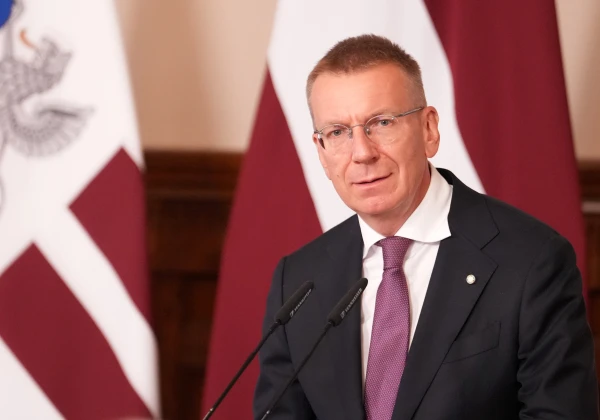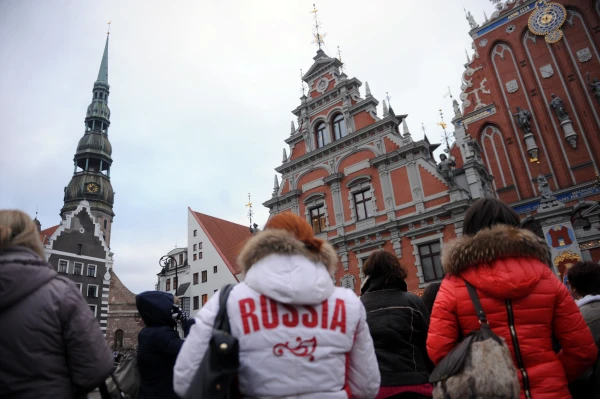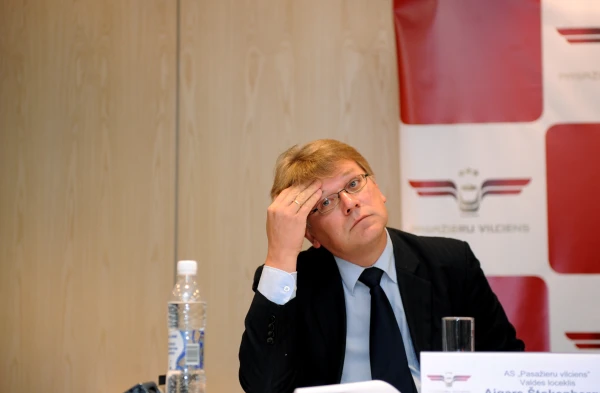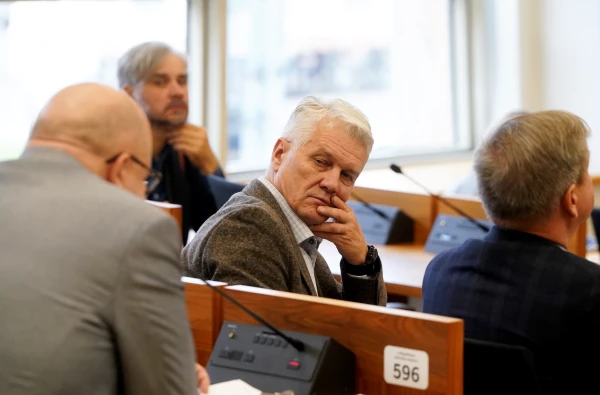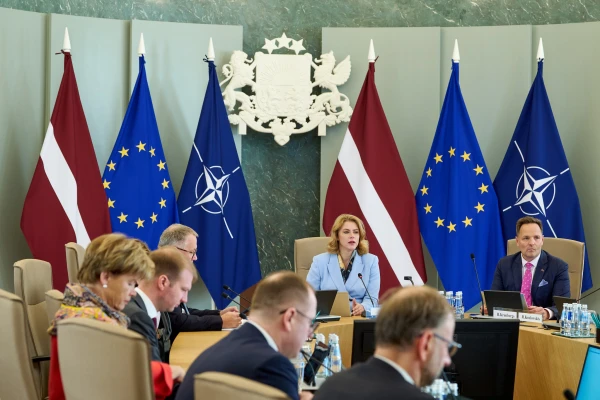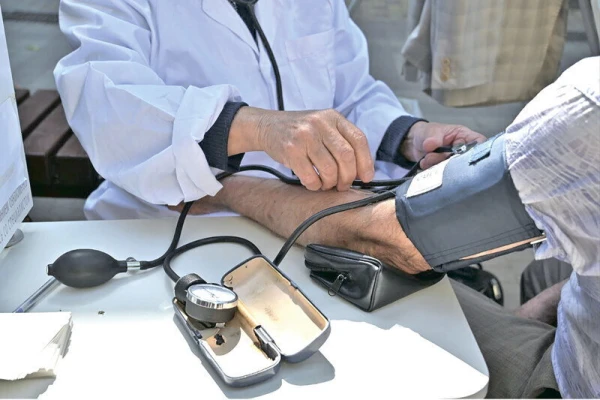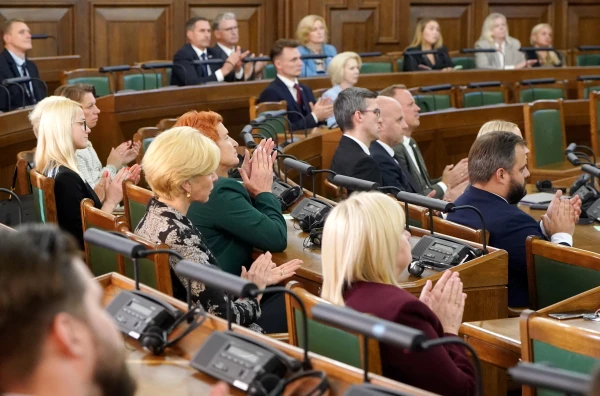
Parliamentarians today submitted the draft state budget for 2026 and a package of accompanying bills for consideration by parliamentary committees, LETA reports.
The package of accompanying bills to the budget for 2026 includes nearly 50 bills, including amendments to certain taxes and a reform of the pension system for years of service.
There are enough votes for now
The voting on the bills showed that the ruling coalition was able to secure a majority of 51 votes in parliament today: the factions of "New Unity" (NU), "Progressives," and the Union of Greens and Farmers (UGF) were joined by independent deputies supporting the coalition, Skaidrīte Abama, Oleg Burov, and Igor Raev. The newly elected Saeima deputy, Janis Dinevics, elected from the UGF list, also voted in favor of transferring the bills to committees.
In turn, during the voting directly on the budget project for next year, independent deputy Andrei Celapiter joined the 51 deputies of the ruling coalition, providing the 52nd vote.
Meanwhile, the opposition managed to gather up to 40 votes, which, however, were not united in all votes.
Earlier, separate sessions of the Saeima had to be interrupted as the ruling coalition could not ensure a quorum. There are 100 representatives in the Saeima, and according to the Constitution and the regulations of the Saeima, sessions can only take place with the participation of at least half of the deputies.
Expenses will amount to 18 billion euros, the deficit will remain significant
In the budget for next year, consolidated revenues of the general budget are planned at 16.064 billion euros, and expenses at 17.945 billion euros.
The leader of the "New Unity" faction in the Saeima, Edmunds Jurevics, previously stated to the LETA agency that the budget project is planned to be considered in the first reading on November 5, and in the final reading on December 3, completing work on December 5.
The chairwoman of the parliamentary Budget and Finance (Tax) Committee, Anda Chaksha (NU), promised on Wednesday, upon receiving the budget project and accompanying bills, to thoroughly examine the expenses of each ministry. She explained that starting next week, representatives of ministries will be invited to the committee to discuss expenses and possible ways to reduce them.
Before the bills are transferred to committees, deputies could speak "for" and "against." Some opposition deputies took advantage of this opportunity, criticizing the government of Prime Minister Evika Silina (NU), claiming that the promised savings have not been found and that the accumulation of public debt continues, which will affect the well-being of the population in the future.
"One big sham"?
The leader of the "United List" (UL) faction, Edgars Tavars, criticized the budget preparation process, calling it "one big sham." According to him, it is necessary to assess individual budget items much more carefully.
Deputy Czeslaw Batnya (UL) noted in the debates that the new school funding reform "Program in School" is being promoted with a "minus" — it is known that next year there will be a shortage of 8 million euros, and in 2027 about 20 million euros.
"If we are introducing a reform, then let’s do it properly in the Saeima and in the state apparatus — allocate the necessary funding," Batnya stated.
Opposition member Svetlana Chulkova ("For Stability") complained that all bills related to pensions for years of service are hypocrisy. According to her, the government is taking money from those who pay its salaries.
Deputy Arturs Butans (NA), as he did last year, called for making the budget more open and transparent, with greater detail on expenses.
The national debt will not exceed 55% of GDP
Compared to the budget for 2025, state budget revenues in 2026 will grow more than expenses. Revenues are expected to increase by 944.6 million euros, expenses by 804.3 million euros.
The revenues of the main budget will amount to 10.9 billion euros, and expenses to 13.2 billion euros. In the special budget, revenues are planned at 5.5 billion euros, and expenses at 5.1 billion euros.
Latvia's gross domestic product (GDP) is projected to be 43.953 billion euros in actual prices next year. Thus, the budget deficit will be 3.3% of GDP, and the national debt will not exceed 55% of GDP.
General government expenses will decrease to 47% of GDP compared to 47.5% this year. At the same time, despite the overall reduction in expenses, defense spending will increase.
Overall, expenses for next year have been reduced by 171 million euros. Priority measures will receive 693.5 million euros, including 448.3 million euros for defense and security needs.
Investments in security, families, and education are planned
The Ministry of Finance (MF) notes that the budget for 2026 and the medium-term budget framework for 2026–2028 have been prepared in accordance with EU fiscal discipline rules and national regulations.
The budget provides for additional investments in state security, support for families with children, and quality education. The MF also points to more than one billion euros in investments from EU funds and an increase in local government revenues by 151.4 million euros.
The MF explains that the budget for 2026 is based on cautious macroeconomic forecasts prepared in June of this year. Moderate economic growth and a gradual decline in inflation are projected in the medium term. Significant contributions to economic growth this year are made by the construction, manufacturing, and trade sectors. Business lending volumes have also noticeably increased: the portfolio of loans issued to enterprises increased by 16% in August compared to August 2024.
Growth, inflation, and deficit
Economic growth this year is projected at 1.1%, next year at 2.1%, and in subsequent years up to 2.2%.
The inflation forecast for 2025 has been raised to 3.5%, mainly due to rising food prices and heating tariffs. In subsequent years, inflation will gradually decrease to 2.3% in 2026 and 2.2% thereafter.
The general government budget deficit in 2025 will be 2.9% of GDP, increasing to 3.3% in 2026 and remaining at around 3.6% in the medium term. The MF explains that the increase in the deficit is related to increased funding for strengthening defense and security. These expenses are carried out within the EU rules flexibility mechanism — a safeguard clause allowing temporary exceedance of deficit and expenditure growth limits if additional funds are directed to defense.
The MF emphasizes that Latvia uses this opportunity responsibly, maintaining the sustainability of fiscal policy and providing for a gradual reduction of the deficit as the safeguard clause expires.
It is also taken into account in the budget that in 2025 the government carried out a labor taxation reform, reducing the tax burden on employers and employees. As a result, budget revenues in 2025–2028 will decrease by about one billion euros.
Thanks to the reduction in budget expenses, fiscal savings of 233 million euros are ensured in 2026, and on average for the period 2026–2028, total savings will exceed 800 million euros, the MF reports.
Expenses on core functions of the state budget are reduced
Compared to the plan for 2025, in 2026, expenses on the core functions of the state budget are reduced: by 16% in the MF, by 10% in the Ministry of Justice, by 9% in the Ministry of Climate and Energy, by 9% in the Ministry of Economics, by 5% in the Ministry of Foreign Affairs, and in several other ministries.
Overall, in 2026, an additional 693.5 million euros are provided for certain government priorities, 724.8 million euros in 2027, and up to 935.9 million euros in 2028. A significant part of this — 448.3 million euros — will be directed next year to strengthen state security, including the development of the National Armed Forces' combat capability, military infrastructure, and border protection systems, as well as support for the domestic defense industry and the creation of new jobs.
The total defense budget for next year will reach 2.2 billion euros. According to NATO definitions, in 2026, Latvia's defense budget will be 4.9% of GDP, in 2027 — 5%, and in 2028 — again 4.9%.
An additional 94.8 million euros will be directed to support families with children and improve the health care system for mothers and children — this includes increasing benefits, improving service accessibility, and enhancing social protection. Funding for health functions will increase by 27.9 million euros next year, reaching 1.9 billion euros.
In the education sector, 45 million euros will be allocated for the implementation of a new teacher remuneration model "Program in School," with an increase in support staff and ensuring quality education throughout the country.
Additional funds are also provided for socially significant activities — expanding palliative care, increasing the availability of social and rehabilitation services, and supporting agriculture.
Investments from EU funds
Investments from EU funds and the Recovery Fund (AF) will also remain one of the main drivers of Latvia's economic growth in 2026, emphasizes the MF. Their volume will exceed one billion euros, remaining at historically high levels and significantly exceeding the indicators of the previous planning period.
The MF informs that these funds are invested in strengthening security, regional development, infrastructure, increasing business competitiveness, and human capital. More than 2.2 billion euros have already been attracted for the implementation of EU fund projects until 2026, and 93% of the total amount of 1.97 billion euros from the AF is reserved for specific investments.
According to the MF, new investments under the EU regulation "ReArm Europe" are particularly significant, allowing up to 10% of EU fund financing to be directed to defense and security projects, including the development of military and business mobility.
In addition to EU and AF funds, other foreign financial assistance programs continue to operate in Latvia. Under the Swiss program, 49.8 million euros are planned until 2029, of which the Swiss grant is 42.4 million euros and co-financing from the state budget for four programs — improving care for children with cancer, reclamation of contaminated areas, applied scientific research, and the development of dual education.
And within the new grant period of the European Economic Area (EEA) and Norway until 2031, Latvia will be able to invest over 100 million euros together with the state budget in three priority areas.
In particular, 43 million euros will be invested in strengthening local development and resilience. This support is aimed at implementing the government's priority "State Security" — creating new shelters, adapting and equipping existing premises, purchasing and installing generators to ensure uninterrupted power supply to medical institutions and social care centers.
"Green" innovations will receive 27.5 million euros — to support businesses and reclaim contaminated areas, and 15 million euros will go to the penitentiary service program: the construction of a women's prison, strengthening services, and rehabilitation services for children with dependencies on psychoactive substances. The MF explains that these foreign investments complement EU funding and reduce the burden on the state budget, ensuring long-term investments in the security and well-being of society.
From the state budget, the largest investments — 545.9 million euros — will go to defense: increasing the combat capability of the National Armed Forces, developing military infrastructure and border protection systems, as well as supporting the defense industry.
Investments in the interior sector — 67.9 million euros — will be directed to modernizing the infrastructure of security services, constructing new depots for firefighters and rescuers, updating the police vehicle fleet, and strengthening civil defense.
Funding is also provided for the development of education, health, and culture infrastructure. The Ministry of Education and Science is allocated 11.9 million euros, including for the digitization of Latvian language resources and the creation of a modern educational environment. Investments in health care are directed to modernizing hospitals and developing the e-health system, while investments from the Ministry of Culture — 5.7 million euros — are aimed at preserving cultural heritage, strengthening digital security, and modernizing museum exhibitions.
Next year, five border municipalities — Ludza, Kraslava, Balvi, Aluksne, and Augsdaugava regions — will receive three million euros to strengthen security at the external border of the EU. The opportunities for municipalities to obtain loans for investment projects, especially in the areas of security, education, and demographics, have also been expanded.
78% to municipalities and 22% to the state budget
The distribution of personal income tax (IIN) for next year is planned in the ratio of 78% to municipalities and 22% to the state budget. The projected IIN revenues in the budgets of municipalities will amount to 2.278 billion euros.
It is expected that the annual increase in the permissible borrowing volume of municipalities next year will amount to 168.14 million euros.
In subsequent years, stable growth in tax revenues to municipal budgets is projected — in 2026, taking into account compensations, the growth will amount to 151.4 million euros or 6.1%. The MF emphasizes that the IIN forecast will be fully ensured, and revenues above the guaranteed level will be directed to debt repayment.
Targeted grants to municipalities for next year will amount to 676.286 million euros.
This includes 527.435 million euros for the salaries of teachers and mandatory contributions to state insurance in kindergartens, schools, vocational and special educational institutions, as well as partially in interest groups.
For the salaries of teachers in special groups of preschool education and specialized boarding schools, as well as for social contributions — 73.96 million euros.
For the salaries of teachers educating children from the age of 5 in municipal educational institutions and social contributions — 72.829 million euros, and for the leaders of creative teams — 2.063 million euros.
The state grant to municipalities for next year will amount to 106.32 million euros, including 50.923 million euros for the financial equalization fund, as well as 51.794 million euros in grants integrated into the financial equalization system. Another three million euros are planned for border municipalities.
A grant of 602,928 euros is also planned for municipalities for residents in nursing homes and centers placed before January 1, 1998 (11,376 euros per resident).
The total increase in guarantees provided by municipalities is set at 56.915 million euros — for loans to municipal enterprises for investment projects, purchasing fuel with deferred payments.
Efficiency of public administration will be increased
The MF reports that measures to increase the efficiency of public administration include reducing administrative costs and staff units in the State Revenue Service, merging the Lottery and Gambling Control Inspection into the State Revenue Service, as well as reviewing the financing of completed infrastructure projects (including the construction of the Liepaja prison) and other measures for more efficient use of public funds.
The government also maintains its commitment not to raise base taxes, providing only those changes that meet the interests of society. Next year, an increase in excise taxes on alcohol and tobacco, gambling tax, and natural resources tax is planned. A reduced VAT rate (12%) is also proposed for a number of food products — bread, eggs, milk, and chicken.
Minimum wage and pensions will be increased
In 2026, an increase in both the minimum wage and the non-taxable minimum by 40 euros is planned — to 780 and 550 euros, respectively. From October 1, 2025, pensions will be indexed to 1,488 euros, ensuring a full review of pensions for 98% of pensioners.
Dividends from state enterprises - to the state budget
The budget for next year provides that JSC "Latvenergo" will transfer dividends of 141 million euros to the main state budget, JSC "Latvijas valsts meži" — no less than 143.896 million euros, JSC "Augstsprieguma tīkls" — no less than 5.716 million euros, JSC "Latvijas loto" — no less than 9.358 million euros, and GP "Latvijas valsts radio un televīzijas centrs" — no less than 6.261 million euros.
At the same time, GP "Latvijas gaisa satiksme" will not pay dividends from profits for the 2025, 2026, and 2027 reporting years to ensure compliance with international and European Union regulations.
The budget law also stipulates that capital companies included in the general government sector have the right not to make payments for the use of state capital provided that part of the profit payable as dividends is directed to cover previously incurred financial obligations of these companies.

